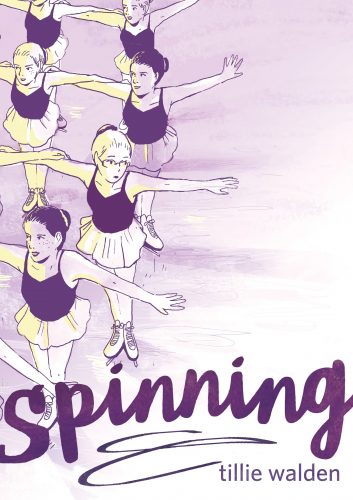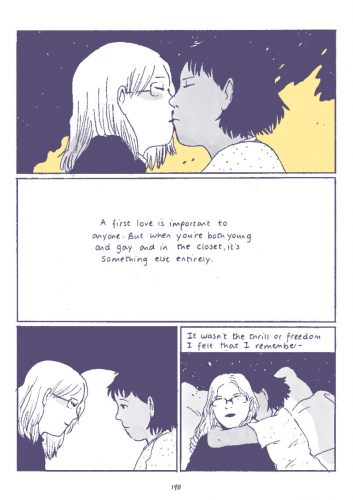Tillie Walden on Her New Memoir and Being a Lesbian in the Figure Skating World

Author: Cathy Camper
October 8, 2017
Graphic novelist Tillie Walden’s stunning new book Spinning, published this September by First Second, is a coming of age memoir. The beautifully illustrated book recounts Walden’s discovery, after ten grueling years training as a figure skater, that the conservative skating world is not for her, and that her true identity is that of an artist and lesbian. Walden is an 2016, Ignatz Award winner, and the author of The End of Summer, I Love This Part, and the webcomic On a Sunbeam, which has been nominated for an Eisner for Best Digital Comic.
Lambda Literary spoke to Walden about writing a memoir centered on finding one’s true self through failure and how her years of figure training also trained her to write such a detailed and insightful memoir.
Spinning is about the immense amount of practice time it takes to become an expert in something. What I loved about your book was that you didn’t end up becoming an expert skater–but you did discover who you really were. What made you take on this big project, and how did you figure out what the book was really about?
That’s so funny, I think about that all the time. How you said you were glad I didn’t become an expert skater – I’m so glad too! Like, so many stories about sports and goals in general become a narrative about reaching for something and finally getting it. And I felt so happy to change that up a bit and write a story about quitting something and using that change to find who I was.
But anyways, that didn’t even answer your question. I took on the project because I realized I had quite a bit of baggage with my ice skating career. After I stopped skating I wouldn’t ever talk about it, I wouldn’t even think about it. And think about this: This is something I did for my whole life, and I refused to talk about it. I shut it down. And when I realized I was doing that, well, I felt that it was unacceptable. I didn’t want to have wounds sitting inside me that I wasn’t facing. So I drew this book to work it all out. And people ask me now, especially after reading my afterword, “Tillie, what’s this book about?” And I still don’t know if I really know. But I’m fine with that.
At the same time you were skating, you also realized you were gay. When you had your first lesbian relationship as a teen, you wrote the main emotion you felt was fear. For other queer kids feeling that same fear today, what helped you get the courage to come out and be yourself, in such a repressive environment?
 God, that’s tough to answer. I don’t really know if I ever found the courage. It was more that I got tired of waiting for the courage to appear inside me. Fear is completely exhausting. And when you’re a teenager the years move so quickly, yet the days are so slow. I sort of expected to find courage in myself someday, but it wasn’t really like that. I think I just.… I realized I would be happier if I was myself. I couldn’t think about how being myself would affect the world around me, because that was just too huge to even consider. For kids facing this problem, I don’t know if I have an easy answer. Every kid is in a slightly different situation, and I don’t know if any broad statements really apply. I guess I’ll say this: I know what you’re feeling. It’s so scary, and I’m so sorry you have to go through this. As queer kids, you’ve had to grow up so much faster than your peers.
God, that’s tough to answer. I don’t really know if I ever found the courage. It was more that I got tired of waiting for the courage to appear inside me. Fear is completely exhausting. And when you’re a teenager the years move so quickly, yet the days are so slow. I sort of expected to find courage in myself someday, but it wasn’t really like that. I think I just.… I realized I would be happier if I was myself. I couldn’t think about how being myself would affect the world around me, because that was just too huge to even consider. For kids facing this problem, I don’t know if I have an easy answer. Every kid is in a slightly different situation, and I don’t know if any broad statements really apply. I guess I’ll say this: I know what you’re feeling. It’s so scary, and I’m so sorry you have to go through this. As queer kids, you’ve had to grow up so much faster than your peers.
But there is a strong, thriving community of queer people to support you, and even if you can’t find them yet, you will someday.
Also side note: When I was working on this book it dawned on me that I didn’t know any other lesbian ice skaters. I knew of gay ice skaters, men, but no women. And since the book came out, I have gotten floods of emails from, yes, lesbian ice skaters. Turns out we exist, and I couldn’t be happier.
This book talks about skating, but your talent as an artist indicates you’ve also put a lot of time into your cartooning as well. Can you share a bit about how you trained yourself as an artist?
I was really committed to becoming a better artist. I was shockingly self-aware when it came to my art. I would look at it when I was 16 and think “Okay, this is really mediocre.” But that wouldn’t get me down. Instead it shoved me ahead because I really wanted to get better. I wanted to be the best (wow, have you noticed that I’m a little competitive?). So once I stopped skating and devoted myself to art, I trained myself. I basically became my own coach. And I studied other indie cartoonists, especially Sam Alden, and watched how he ballooned into popularity. And I thought: I’m going to do that too.
Spinning was a long work, with very meticulous artwork. Though you gave up skating, it struck me that some of your skating training also informs your work as a cartoonist. Could you share how training as a skater helped you as a creator?
Oh absolutely! Skating practice requires time. A lot of time. I can’t even begin to explain how much time. So much. And comics are very similar. You have to put in the hours, and I learned to do that in my skating. But it goes deeper than that, as well.
When you’re learning to a new jump on the ice, you usually land.. I don’t know, one out of… twenty? Maybe less, maybe more. But basically, you screw up a lot more than you succeed. And sometimes you’ve mastered a jump but you get on the ice and you’re off and you just can’t land it, it’s the most frustrating thing in the world. But having lived through that, I really became comfortable with…missing the mark? Does that make sense? Like, I knew that perfection was an impossibility. I knew that success was rare and special and elusive. And I realize now that I approached my comics in the same way. It’s ok to fall. And you have to keep going, even when you’re down. I had to power through drawing Spinning, and it got so hard sometimes. But I knew from my skating that if you just keep trying then eventually you’ll land that goddamn jump. So I kept going.
Spinning is both a memoir and a Bildungsroman–a coming of age story. What’s next for you–will you continue writing memoir? Also, would you ever consider collaborating, or do you prefer to both write and draw?
Ah, what is next? I get asked that a lot, but it’s a good question. And I can’t even answer it (laughs). I know this: no more memoir from me, for a awhile, at least. Fiction is my true home, Spinning is a bit of an outlier. I have plenty of other projects in the works, and there will be a lot more from me in the coming years. Do not fear.
I could see myself collaborating, at some point, but who knows. I try to keep myself open to all possibilities, and also open to saying no.


